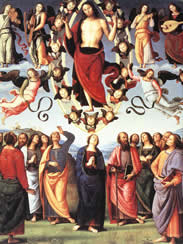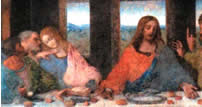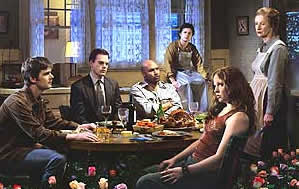Ascension of Our Lord Jesus Christ
Acts 1:1-11
Ephesians 1:15-2
Luke 24:49-537
+ In the Name of the Father, and of the Son, and of the Holy Spirit. Amen.
May we in heart and mind thither ascend and with Christ continually dwell. So ends Thomas Cranmer's exquisitely beautiful Collect
for Ascension Day, leading us into the spatial geography of this difficult
doctrine. One must  ask whether God and heaven (to which Jesus ascends)
are up and out, in the skies. If not, and the language is metaphorical
for a deeper, inward truth, where should the "thither" take
us? If you prefer, as I, to let the problem simmer, you may recall from
the romantic comedy "You've Got Mail" that "thither"
is one of the archaic words which delight Kathleen as a reader of Jane
Austen, to the mystification of her chatroom lover played by Tom Hanks.
ask whether God and heaven (to which Jesus ascends)
are up and out, in the skies. If not, and the language is metaphorical
for a deeper, inward truth, where should the "thither" take
us? If you prefer, as I, to let the problem simmer, you may recall from
the romantic comedy "You've Got Mail" that "thither"
is one of the archaic words which delight Kathleen as a reader of Jane
Austen, to the mystification of her chatroom lover played by Tom Hanks.
If you apprehend the truths of faith through language, you may want to know more about Charles Wesley's exquisite Ascension hymn, which I like to imagine Jane Austen singing and which ends tonight's service. I'm afraid our version is a bastard, but since the alterations began in 1820, I cannot use it for anti-modernizing invective. Verse 4 originally said,
| Grant our hearts may thither rise, Following thee beyond the skies. |
For Wesley loved the 1662 Prayerbook and naturally wanted to piggy-back on Cranmer's felicity. But Wesley was no slave to tradition, having a strong streak of originality. So it is a pity that we have lost his original and spicy opening, which was not the bland —
| Hail the day that sees him rise, Glorious to his native skies, |
| but — |
| Hail the day that sees him rise, Ravished from our wistful eyes! |
We think of the 18th century,
the Age of Reason, as cool and unpassionate, but if you look below the
powdered wig of C.Wesley (or J.S. Bach),  you
detect the contented eye-gleam of happy marriage and a healthy sex-life.
you
detect the contented eye-gleam of happy marriage and a healthy sex-life.
When we've recovered from the shock, we notice that "ravished"—seized and carried by force, deflowered, violated, raped—perfectly describes the loss felt by thedisciples when Jesus was seized and taken away from them. That his risen body had to be ravishingly attractive, in the brief moments they encountered him after Easter, confirms Wesley's brilliant choice of "wistful"—with melancholy yearning and pensive longing—to describe the disciples' eyes on the mount of Ascension. However the Gospels try to convince us that the Holy Spirit is a superior substitute for Jesus, it seems to me that in existential terms the Ascension is about letting go, coping with grief, dealing with loss. Thus we snuff the light of the glorious Paschal Candle after the Ascension Gospel, for a semi-dark ten-day interval, until the Holy Spirit descends in the brilliance of red-gold flame.
If only such intervals in our
actual lives could be so efficiently tidied away! The Kubler-Ross stages
of grief—denial,  bargaining,
anger, depression, acceptance—are overfamiliar. But understanding the
normality of the process does not negate, streamline, or standardize the
task of survival when we lose a job, a relationship, a way-of-life, something
or someone precious that we can't do without. Most of the time we refuse
to allow such an unthinkable into consciousness. We are rightly superstitious
of preparing for what we cannot endure. That is why you might not read The
Year of Magical Thinking, in which Joan Didion describes
step by clear-eyed step, how she behaved when her husband of 40 years
fell over, dead, while she made supper one night. Both writers, they had
spent their working lives in adjacent rooms. So, when he was gone her
most profound conviction, despite her cucumber-cool exterior, was that
he would be coming back. Her Anglican Christian sensibility does not diminish
the horror of her reporting.
bargaining,
anger, depression, acceptance—are overfamiliar. But understanding the
normality of the process does not negate, streamline, or standardize the
task of survival when we lose a job, a relationship, a way-of-life, something
or someone precious that we can't do without. Most of the time we refuse
to allow such an unthinkable into consciousness. We are rightly superstitious
of preparing for what we cannot endure. That is why you might not read The
Year of Magical Thinking, in which Joan Didion describes
step by clear-eyed step, how she behaved when her husband of 40 years
fell over, dead, while she made supper one night. Both writers, they had
spent their working lives in adjacent rooms. So, when he was gone her
most profound conviction, despite her cucumber-cool exterior, was that
he would be coming back. Her Anglican Christian sensibility does not diminish
the horror of her reporting.
Many of us would settle for
the cheap comforts of living in a fantasy-world, which is why The DaVinci
Code is so popular.  I
don't read bestsellers, but having a ridiculous and puerile devotion to
every line delivered by Tom Hanks, I saw the movie. In contempt of the
vicious reviews, I quite enjoyed it. Leaving aside the questions of who
sat to Jesus' right at the Last Supper, whether Jesus could have had a
marital life like Bach and Wesley (which, to my way of thinking, would
not affect his power to redeem us), or if the hierarchy has pulled off
the greatest conspiracy in human history (I would not attribute to them
the fleet-footed cleverness required)—for me, the movie rang spiritually
true on two counts. In presenting a quest, an enchantingly intricate puzzle
to solve, the movie reminds us that every individual's earthly journey
has a point, a goal, something to find. Unfortunately, our clues won't
be as obvious as those found in medieval crypts or renaissance paintings.
Second, when connection is made to that great Arthurian legend of the
Holy Grail, the chalice used at the Last Supper and so fortuitously misplaced,
the witty question, "But you don't think it's a cup,
do you?" encapsulates the way God cheekily beckons and maddeningly
eludes us. That's why the mystery of Ascension depicts Jesus as zooming
up and away.
I
don't read bestsellers, but having a ridiculous and puerile devotion to
every line delivered by Tom Hanks, I saw the movie. In contempt of the
vicious reviews, I quite enjoyed it. Leaving aside the questions of who
sat to Jesus' right at the Last Supper, whether Jesus could have had a
marital life like Bach and Wesley (which, to my way of thinking, would
not affect his power to redeem us), or if the hierarchy has pulled off
the greatest conspiracy in human history (I would not attribute to them
the fleet-footed cleverness required)—for me, the movie rang spiritually
true on two counts. In presenting a quest, an enchantingly intricate puzzle
to solve, the movie reminds us that every individual's earthly journey
has a point, a goal, something to find. Unfortunately, our clues won't
be as obvious as those found in medieval crypts or renaissance paintings.
Second, when connection is made to that great Arthurian legend of the
Holy Grail, the chalice used at the Last Supper and so fortuitously misplaced,
the witty question, "But you don't think it's a cup,
do you?" encapsulates the way God cheekily beckons and maddeningly
eludes us. That's why the mystery of Ascension depicts Jesus as zooming
up and away.
Can you bear one final example
from pop culture? Sometimes accused of insulting Christianity, pop culture
often shows a wistful yearning for  enlightenment,
which organized religion (sadly) fails to address. One example is the
now-complete five-year HBO series Six
Feet Under. Two warnings: there's significant "adult content,"
and your rector cannot comprehend my interest. "When I've seen it,"
says Father D, "there's nothing but unattractive characters enmeshed
in the most decadent patterns of self-destructive behavior." "I
suppose," I quaveringly reply (and this is the only matter on which
we ever disagree). "But what if God looked at things so harshly?
Besides, I can't stop watching because I want to know what happens next."
enlightenment,
which organized religion (sadly) fails to address. One example is the
now-complete five-year HBO series Six
Feet Under. Two warnings: there's significant "adult content,"
and your rector cannot comprehend my interest. "When I've seen it,"
says Father D, "there's nothing but unattractive characters enmeshed
in the most decadent patterns of self-destructive behavior." "I
suppose," I quaveringly reply (and this is the only matter on which
we ever disagree). "But what if God looked at things so harshly?
Besides, I can't stop watching because I want to know what happens next."
Most churchgoers could or should see themselves in David
Fisher, the young co-owner of his family's funeral parlor. He is lovable
but priggish and uptight.  He
is internally divided between conventionality (wanting to be a deacon—actually
vestryman—at his Episcopal church) and a hidden attachment to a policeman,
whom he tries unsuccessfully to love while hating himself. In episode
four, David is embalming the body of a 21-year-old Latino (Manny) who,
late one night was assassinated by members of a rival L.A. gang. There
is contention between family and gang about the funeral, and the Fishers,
needing the business, also fear reprisal from opposing gangs. Suddenly
the spirit of Manny materializes across the mortuary slab and starts speaking
to David across the naked corpse. "Quit lookin' at me, girl"
says Manny, feeling violated by the gay undertaker's eyes. "I'm not
looking at you," says the untruthful David. So begins an uneasy association
that develops between unlikely comrades. Manny has advice for David's
personal and professional lives. "Stand up. Step to the plate. Throw
some blows. Give your man respect." David is surprisingly resposive
to this education, as the disciples were to their Son-of-Manny teacher
whose death could also be considered a gangland casualty. David nearly
becomes Manny's "dawg," an endearment between gang-members.
He
is internally divided between conventionality (wanting to be a deacon—actually
vestryman—at his Episcopal church) and a hidden attachment to a policeman,
whom he tries unsuccessfully to love while hating himself. In episode
four, David is embalming the body of a 21-year-old Latino (Manny) who,
late one night was assassinated by members of a rival L.A. gang. There
is contention between family and gang about the funeral, and the Fishers,
needing the business, also fear reprisal from opposing gangs. Suddenly
the spirit of Manny materializes across the mortuary slab and starts speaking
to David across the naked corpse. "Quit lookin' at me, girl"
says Manny, feeling violated by the gay undertaker's eyes. "I'm not
looking at you," says the untruthful David. So begins an uneasy association
that develops between unlikely comrades. Manny has advice for David's
personal and professional lives. "Stand up. Step to the plate. Throw
some blows. Give your man respect." David is surprisingly resposive
to this education, as the disciples were to their Son-of-Manny teacher
whose death could also be considered a gangland casualty. David nearly
becomes Manny's "dawg," an endearment between gang-members.
Finally the funeral is over and the Fishers are about
to exhale. The mother of Manny (a Latin Madonna remembering the happy
baby she held 21 years ago) appears at the door to summon them to what
feels like an execution chamber. Behind the door are stern gang  members
who join hands with Manny's parents and the Fishers in a circle round
the coffin (Manny is in the circle too). The leader (whose name, "Powerful,"
is tattooed across his jugular vein) begins, "Merciful Jesus, bring
rest and peace to our departed son, brother, friend, Manuel Antonio Pedro
Bolin; may he live with you in light, forever." He then goes on to
lift thither the various individuals in their unique situations around
the circle. The music and lighting convey an amazingly transcendent cinematic
moment. The coffin is swiveled for departure by the gang-brothers, and
Manny shakes off David's hand. "You're too young," cries the
undertaker. "I done what I could; it's my time; I'se got to go,"
says Manny, laying a hand on his disciple's shoulder. "Be a man,
David. Don't be a punk."
members
who join hands with Manny's parents and the Fishers in a circle round
the coffin (Manny is in the circle too). The leader (whose name, "Powerful,"
is tattooed across his jugular vein) begins, "Merciful Jesus, bring
rest and peace to our departed son, brother, friend, Manuel Antonio Pedro
Bolin; may he live with you in light, forever." He then goes on to
lift thither the various individuals in their unique situations around
the circle. The music and lighting convey an amazingly transcendent cinematic
moment. The coffin is swiveled for departure by the gang-brothers, and
Manny shakes off David's hand. "You're too young," cries the
undertaker. "I done what I could; it's my time; I'se got to go,"
says Manny, laying a hand on his disciple's shoulder. "Be a man,
David. Don't be a punk."
To compare those words to the benediction of the ascending Jesus might be blasphemy, ensuring this guest-preacher never gets invited back. It's true the architecture and customs of this church preclude circle-prayer in our service (too much like wicca or group-therapy anyway?). But you might imagine during the canon of the mass that you are one of the unattractive characters with a self-destructive behavior pattern. Imagine holding hands around the altar, wistfully bringing your losses, gaining strength from our common experience of Jesus' departure, hoping for the occasional flickers of his presence, which enlighten and ravish.
+ In the Name of the Father, and of the Son, and of the Holy Spirit. Amen.
© 2006 Paul Gabriel Myers, O.S.B.
